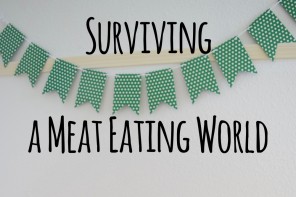We all have something that scares us: whether it be ghosts, goblins, heights, the dark, monsters… One of the things that scares me? Frankenfood.
Well, it’s not exactly called “frankenfood”, but the term perfectly describes what it is. It is food that has been genetically changed using parts from different species. Genetically modified foods. Yum.
Let me elaborate a bit more. In the past, farmers have used breeding in order to instill certain desirable traits into their crops. They might save the seeds of a crop that survived a frost, or that insects did not devour. This was a method of natural breeding. Recently, the advances in bioengineering have allowed for this type of breeding to be taken to an entirely different level. Scientists are able to isolate a gene responsible for a desired trait, and inject it into the cell of a plant. But these genes can come from any organism. For example, a gene from a species of bacteria was injected into corn in order to have the corn produce its own pesticide. The benefits of this technology is that crops are created that are: herbacide resistant, pesticide producing, frost resistant, and disease resistant. But when we start messing with mother nature by injecting fish genes into canola plants, what are the consequences?
Studies have shown that the pollen of these plants cause harm to insects. For instance, pollen on corn plants are deadly to monarch butterflies. Also, colony collapse disorder with bees has been linked to the use of genetically modified crops. When plants are engineered to make pesticides, those toxins often kill insects that are beneficial to our ecosystem. When plants are engineered to be resistant to herbicides, these strong chemicals kill or harm whatever species comes into contact with them. Also, it can be compared to antibiotic resistance in humans; “pests” become resistant to pesticides, and stronger, more toxic ones need to be produced. It is a dangerous and unnecessary cycle to a delicate system of insects and other species. Because this is still a new technology, other potential harmful effects are simply not researched enough.
This technology has been created by none other than the same companies that produce pesticides and herbicides. Because these companies are all about profits, I cannot say it is surprising that their studies, which they are required to do, on the effects of GMO’s are tampered with or skewed. In fact, even the EPA has found evidence of tampering. The crops that they create are also usually ‘suicidal’, which means they cannot reproduce. So when those plants have pumped out a harvests worth of crop, the farmers must buy more seeds from the company. But it gets worse. These companies have bought patents for their genetically modified crops. There has been case after case of companies like Monsanto suing farmers that have GM crops growing on their property. Monsanto argues that these farmers obtained the seeds from Because of the naturally occurring process of cross pollination, there really is no way for a farmer to avoid this if he is surrounding by farms that use GM crops, or if a truck with GM crop seeds rides by the farm, etc. The price? These farmers’ crops are being ruined, their farms put out of business, and the steady increase of GM crops. And to top it off, the homogeneity of farms poses an additional risk by decreasing diversity in the plant world.
And the claim that genetically modified foods are the way to “feed the planet”? In many studies and in terms of common sense, this is proven to be false. Most of the soy and corn planted (the two most common GM foods) goes on to become livestock feed in order to sustain the U.S.’s hunger for meat. Plus, poorer farmers around the world cannot afford to keep buying the expensive seeds and fertilizer to grow it. Organic food is packed with more nutrients and seeds can be saved for the next season.
Genetically modified crops are already showing detrimental effects on insects. What about humans? The planet? The earth has had billions of years to perfect the ecological system of plants to work harmoniously with its environment. How can we mess up this delicate balance without dire consequences? France has already banned GMO’s, what are we waiting for in the U.S.? I suppose it has something to do with the leaders in MANY government agencies having DIRECT ties with companies like Monsanto. If our government is being run or coerced by the same people that are profiting from GMO’s and pesticides, then who is really making our decisions?
To help, simply avoid buying GM foods. The most common are corn, canola, and soy. Foods containing these ingredients will usually be labelled as non-GMO foods, so be on the lookout for that. Also, snack foods like chips will most likely contain GMO’s, so yet another reason to avoid those. Organic food must be free of GMO’s as well as harmful pesticides, so it’s a good bet to stick to organic, whole foods.





